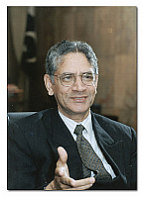Speech before the Diet members of ruling Liberal
Democratic Party of Japan
June 2000--Tokyo
Dear Taro Nakayama,
Distinguished Members of the LDP,
Foreign Policy Research Counsellors,
It is a great pleasure and honour to be appearing
before this distinguished gathering of Japanese
politicians and statesmen whose perceptions and views
have an important bearing on the formulation of
Japanís foreign policy.
There are perhaps very view other countries as
universally liked as Japan. We hold Japanís
constructive diplomacy in great respect. Your country
takes principled positions on international issues.
The friendship between Pakistan and Japan rests on
linkages that are both ancient and contemporary. They
go back two thousand years in time, when the Gandhara
civilization flourished in what is now Pakistan, from
where Mahayana Buddhism found its way to Japan. In
contemporary times Pakistanís geo-political location
in close proximity to the Gulf and Central Asia is a
matter of special interest to Japan. Pakistan
contributes to the peace and stability of this
important region and the safety of the sea-lanes of
Southeast and East Asia including Japan. Pakistan is
an important member of the community of Islamic
nations. Last but not least, a nation of 140 million,
Pakistan offers a sizeable market for trade and
investment.
Our common heritage and these mutual interests have
enabled our countries to develop a mutually beneficial
bilateral cooperation.
Over the decades Japan has extended generous
financial and technical assistance to Pakistan. For
several years before 1998, Japan was the largest donor
of bilateral assistance to Pakistan. Your country
thus contributed significantly to our economic
development, for which we remain grateful.
Japan is one of our major trading partners. Also,
Japanese private investment contributes greatly to
Pakistanís industrial and infrastructural development.
The potential for further cooperation in these and
other fields specially in the I.T. sector is much
larger than realized so far.
Now, I will address some of your concerns. It is
true the present government in Pakistan did not come
into power through democratic means but it is not a
military government. The country is being run as far
as possible according to the Constitution; civil laws
are intact, fundamental rights are being observed and
the press remains as free as anywhere in the world.
Judiciary is independent, and an elected President is
in office. Unfortunately, the reason for the change
of government was the consistent mis-governance by
politicians. But this does not mean that we are
against democracy as a system. The Supreme Court of
Pakistan has given our government three years to
implement its agenda of reforms. General elections
will be held before 12 October next year. Meanwhile,
the Government is engaged in strengthening foundations
for a stable and sustainable democracy.
We agree that the world community, and specially Japan
has a legitimate interest in the containment of
nuclear dangers. Pakistanís decision to conduct
nuclear tests was in response to our neighbourís
tests. As we have no nuclear umbrella it had become
necessary for us to develop our own capability to
deter any threat to our security. But our nuclear
programme is modest. Pakistan has no ambition to
global or regional power status. We have neither the
desire nor the need to engage in any arms race.
Pakistan has declared a moratorium on further tests.
We will not be the first to resume testing. Pakistan
is thus pursuing a unilateral policy of restraint and
responsibility. In effect, we are implementing the
main purpose of the Comprehensive Test Ban Treaty,
which is to bring a halt to nuclear explosion tests.
Pakistan voted in favour of the treaty in 1996. We
have not signed the treaty only because we have not
yet succeeded in our efforts to build domestic
consensus.
Among other issues that may be of concern to you I
may mention Afghanistan. Contrary to some
perceptions, specially in the international media,
Taliban are not Pakistanís creation nor are they being
supported, sponsored or endorsed by Pakistan. Taliban
have emerged as the dominant political force in the
country occupying 95% of the territory. They are a
reality we cannot deny.
Our policy on Afghanistan is that we want to see
restoration of peace and an end to fighting in that
war ravaged country. We are in favour of a ceasefire
and wish that the parties concerned sit together and
reach a settlement ensuring peace and normalcy. To
that end we have been supporting the UN efforts
specially through the forum 6+2. We would also
support Japan for any initiative that it may wish to
take. We are abiding by the Security Council
resolution on sanctions. We were as outraged as the
international community by the Talibanís destruction
of Buddhist statues and made more efforts, perhaps
more than any other country, to dissuade the Taliban
from carrying out this act which is in violation of
the tolerant and humanistic spirit of Islam.
There is also a popular misperception as if Pakistan
is encouraging fundamentalism. Pakistan is neither a
fundamental state nor encouraging any militant or
radical version of Islam.
Pakistan, as I said, values its relations with Japan.
We share your commitment to peace and security as
well as non-proliferation and economic progress of
developing countries. Unfortunately, because of the
sanctions, economic aid to Pakistan has stopped,
adversely affecting our economic development.
Economic development and peace and security are
inseparably linked. It is time for Japan to review
whether continuation of the sanctions is advancing
your economic and political interests in the region.
Issues like CTBT are not bilateral issues. They are
regional and global issues and are not susceptible to
solutions through economic pressures. The best
instrument are international forums specially United
Nations where we have always supported various
initiatives of Japan, including your resolution, ďA
Path to Total Elimination of Nuclear WeaponsĒ.
| 


